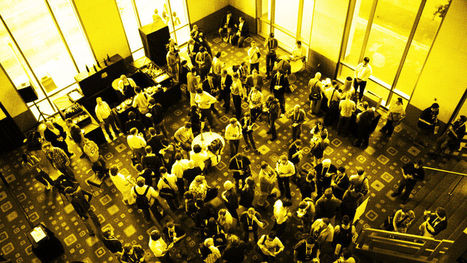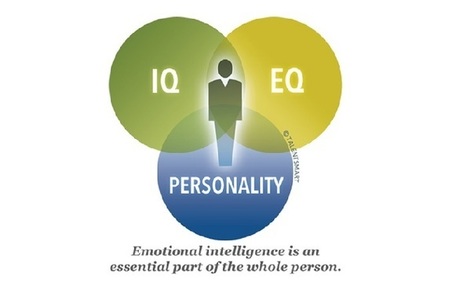 Your new post is loading...
 Your new post is loading...
Negotiation is a scary thing. Whether you’re a college grad advocating for a salary bump for the first time, or a seasoned employee who needs to convince their bosses to allocate a bigger budget for training and development–it’s a situation filled with nerves, personality clashes, egos, and uncertainties. Yet it’s something that all of us have to do, and the only way to do it successfully is if we know how we can leverage our strengths as best as we can in the situation that we’re in. Fast Company reached out to negotiation experts to learn how our personality traits can affect our negotiation styles, and why a collaborative “win-win” approach isn’t always the most effective.
Via The Learning Factor
Find it hard to advocate for yourself? You’re not alone. The personality trait that psychologists call “agreeableness” describes how motivated you are to get along with other people. If you’re highly agreeable, that motivation can sometimes prevent you from sticking up for your own interests. Anytime you ask for something at work, you run the risk that you’ll be told “no”–and possibly aggravate the person you’re asking. As a result, agreeable people may be put off from asking in the first place. This can be a problem, because research suggests that agreeable people tend to make less money than disagreeable people (even accounting for the fact that disagreeable people lose their jobs more often). And in leadership roles, agreeable people may not be as good at getting their teams all the resources they need. So what can you do to be more assertive even when it just isn’t in your personality to do so? Here are a few tips.
Via The Learning Factor
Most people won’t admit it, but we size up other people's characters all the time. In fact, research suggests that it takes just 30 seconds to make up our minds about someone’s intelligence and personality (we make other assessments even faster) and that these evaluations are surprisingly accurate. In one study, researchers showed participants short videos of different couplesinteracting, and participants were able to detect which individuals had cheated on their partners. Likewise, observers watching videos of randomly selected speed daters were able to infer participants' level of romantic interest. Even when the people being evaluated are children, observers can infer their character with a similar degree of accuracy than the children’s parents do. So the idea that you can’t judge a book by its cover is inconsistent with the evidence: People, it seems, are fairly transparent and we can see through them pretty easily and accurately
Via The Learning Factor
I'm sure you've been asked many times whether you're an introvert or an extrovert. For some people, it's an easy choice, but for most of us, it's difficult to choose one way or the other. It's hard to choose because the introvert/extrovert dichotomy reflects a tired and outdated view of personality. Personality traits exist along a continuum, and the vast majority of us aren't introverts or extroverts-we fall somewhere in the middle. Personality consists of a stable set of preferences and tendencies through which we approach the world. Personality traits form at an early age and are fixed by early adulthood. Many important things about you change over the course of your lifetime, but your personality isn't one of them.
Via The Learning Factor
When it comes to love, opposites attract, but in business, the tendency can be to gravitate toward people who are similar. Having others agree with and support you feels energizing, but it can also be limiting. In fact, partners who are polar opposites can strike the perfect balance for an effective and successful business, says Ruth Palacio, a corporate trainer who specializes in teaching respect in the workplace. "Understanding the value of what each partner possesses, and respecting the differences of one another are two main ingredients necessary for a successful business partnership," she says. "A third is setting a clear structure outlining each partner’s role and specific function based on their identified strengths."
Via The Learning Factor
Much attention is paid to the office bullies, jerks, and energy vampires of the world. These are the folks who drain productivity and make that third cup of coffee necessary to face going to the office. Sometimes, it seems like they’re everywhere. But that doesn’t seem to be the reality. While it’s probably not surprising that the 2015 report Employee Job Satisfaction and Engagement by the Society of Human Resource Managers (SHRM) found that 44% of relationships with coworkers were "very important," what may be surprising it that the report also found that 79% of employees were satisfied with those relationships. So, maybe our coworkers aren't as bad as we make them out to be. There are several types of people that can be particularly beneficial. Hiring managers, take note: These are the five types of coworkers everyone needs in the office.
Via The Learning Factor
When considering whether or not to work from home, you may think that the biggest consideration is if you are an introvert who likes to work alone. But Michael Segovia, lead trainer for the Myers-Briggs Type Indicator (a personality assessment tool that is used by around 80% of Fortune 1000 companies to give employees a better understanding of how their personality preferences affect their working lives), says that anyone, regardless of their personality, can work from home. The trick to working from home effectively is self-understanding. Segovia identifies six personality preferences and shares ways in which we can work from home effectively within these personality traits.
Via The Learning Factor
Introverts recharge by spending time alone. They lose energy from interacting with other people for long periods of time, particularly in stimulating, crowded environments. Extroverts, conversely, lose energy from spending time alone. They recharge by interacting with other people in highly social environments. This personality dimension has nothing to do with shyness. According to author Susan Cain, presiding commander in chief of the introverts, shyness is a fear of negative judgment, while introversion is a preference for quiet, minimally stimulating environments. In other words, a lack of interest in socializing (introversion) is clearly different than fearing it (shyness).
Via The Learning Factor
If it’s true then that introverts are having a (quiet) moment in the spotlight, is it coming at the expense of extroverts in the workplace? First, let's go back to the genesis of these personality types. In Carl Jung’s analysis, extroverts get energized by being around others while introverts charge their batteries in solitude. This simple definition debunks the myth that introverts are shy and their withdrawal is a result of feelings of inadequacy or depression.
Via The Learning Factor
Is fear holding you back from trying something new or going after what you really want? Here are some ways to get past it. I hate fear. Fear has cost me a hefty sum in dental bills from grinding my teeth. Fear interferes with sleep, digestion, and many other things that make life worth living. When you examine some of the worst things human beings have done, you'll often find fear as the root cause. There's no doubt about it: Fear sucks. Here's what's worked best for me over the years. (And if you've found something else that works, I'd love to hear it!) 1. Ask yourself: Should I take action to solve this fear?
Via The Learning Factor
|
You know those people with a seemingly magnetic force that attracts all types of people? Whether they’re engaging you in a light and friendly chat or a meaningful conversation, they just seem to have a presence you wish you had. It’s easy to sum it all up and say that some people just have it, and others just don’t, but that’s an unproductive way of thinking about it. There’s absolutely no reason why you can’t also be the type of person who charms the pants off of everybody. If you consider yourself to be socially awkward, or just chronically shy , you may feel like it takes a lot of effort to have engaging interactions with others. For me, I know if the person I’m talking to seems uncomfortable, I start to think that I’ve offended or bored him. Is he thinking about his to-do list right now? Am I that lame? Without some type of visible reassurance telling me the person I’m speaking with is enjoying the conversation, I struggle to be present and am bound to forget about the individual.
Via The Learning Factor
Many organisations are looking at developing more effective agile working strategies to enable their people to work with more flexibility, freedom and time/cost efficiency. The immediate focus for these organisations is often on the technology and work space solutions to ensure their teams are equipped to work anywhere with WiFi and a power source.
What often gets overlooked or ignored – sometimes because it is simply too difficult – is the way that people respond and adapt to agile working. The psychology behind agile working is interesting and not at all straightforward, and so in this article I will explore some of the important findings from our own research and work with leaders in this field.
Over a period of five years we were invited, by one of the world’s leading technology companies, to get involved in researching the impact of agile and remote working on their leaders and teams.
We looked in particular at the psychological impact on team members and their leaders, as well as the performance implications and productivity. Through a series of interviews, live observation of interactions between teams that were using video and telecoms technology, as well as gathering data on the personality and attitudes of leaders and their teams, we built a picture of what it takes to be successful in an agile environment.
So, lets examine in more detail one of the key findings, which is that there are definite characteristics that enable some people to be better and more effective working in an agile environment.
Via David Hain
Advantages of Being an Ambivert When you understand what it's like to be both an extrovert and an introvert, it can help you relate to the people you work with better. Especially, if you are in a leadership position. Here are the ways I've used being an ambivert to my advantage. 1) I know when to give introverts time to collect their thoughts. Introverts aren't comfortable being put on the spot. They appreciate time to contemplate and then respond. I allow my introverted coworkers ample time to review and come to their own conclusions so they can feel comfortable articulating their ideas and responses. 2) I know when to give extroverts the opportunity to speak their mind. Extroverts want to openly contribute. They are energized by speaking and engaging with others. I create opportunities for my extroverted coworkers to talk and share their thoughts and feelings so they can be heard. 3) I can sense when an extrovert is overwhelming an introvert. When an extrovert is spending too much time talking, it can be a major distraction for the introvert. There are times when I need to step in and create opportunities for the introvert to have some quiet time to calm his or her brain.
Via The Learning Factor
Open office with plenty of private space? Shopify did it and so can you.
A recent international study surveyed more than 500 business leaders and asked them what sets great employees apart. The researchers wanted to know why some people are more successful than others at work, and the answers were surprising; leaders chose “personality” as the leading reason. Notably, 78% of leaders said personality sets great employees apart, more than cultural fit (53%) and even an employee’s skills (39%). “We should take care not to make the intellect our God; it has, of course, powerful muscles, but no personality.” –Albert Einstein
Via The Learning Factor
Sometimes, stress can seem like a full-time job. Many of us try to avoid it or, failing that, manage or mitigate it. But, Kelly McGonigal, a lecturer at Stanford University and author of The Upside of Stress, makes the case for embracing the stress in your life. "We have this story about stress that says when stress is present, there’s something wrong with me or something wrong with my life," she says. But the reality is that there’s no stress-free version of your life available to you—it’s always going to be there. Often, the reason we have stress in our lives is because we’re leading rich lives and something we care about is at stake, she says. Constantly avoiding or reducing stress could mean not striving for certain goals or taking risks that could lead to great rewards, such as a new job or relationship. Instead, McGonigal advocates changing our attitudes about stress and embracing it. That’s easier said than done, but following several steps can help.
Via The Learning Factor
Toxic people are everywhere, and most of us know at least one or two. We may live with them, work with them, lead them, or know them socially. And if you've ever spent time with truly toxic people, you already know how destructive and exhausting they can be. Just as with any kind of toxin, you need to limit your exposure and keep yourself protected. But a critical first step is to recognize when a person is toxic. Unfortunately, toxic people don't come with a warning label--but there are things you can look for.
Via The Learning Factor
Whatever their personality quirks and limitations, your grandparents probably simply gritted their teeth and got on with life, toughing out any difficulties that arose. But these days we live in the age of self-help. That's great news for those with mental trauma or problematic personalities. Help abounds to assist people who want to become the best, happiest version of themselves, alleviating a lot of human misery. But it is possible to take self-help too far.
Via The Learning Factor
You’re a more-than-qualified professional ready to take on the job market, and although you know the job search can be highly competitive, you believe your experience, online reputation and accomplishments will make you a shoe-in at any organization. There’s just one problem: No one is calling you back. This is an all-too-common story in the job search saga. With an average of 250 resumes received per corporate job opening, it's clear that employers are looking for a little something extra in applicants — and perhaps the key factor you’re missing is emotional intelligence.
Via The Learning Factor
In a recent episode of the new ABC drama Mind Games, one of the characters mentions an interesting personality trait that defines the most popular people: They more readily admit their weaknesses rather than waiting for them to be revealed over time. The show is about using cunning tricks to manipulate others and ensure a positive outcome, so it's a bit ridiculous, but there's truth in the observation. In the office, it's possible to exhibit traits that help you to be more likable. In my years as a corporate manager and developing my writing career, I've noticed when people appear more likable, and I've tried to develop these traits myself. Here are a few to cultivate.
Via The Learning Factor
|



 Your new post is loading...
Your new post is loading...



































A collaborative approach isn’t always the best option.